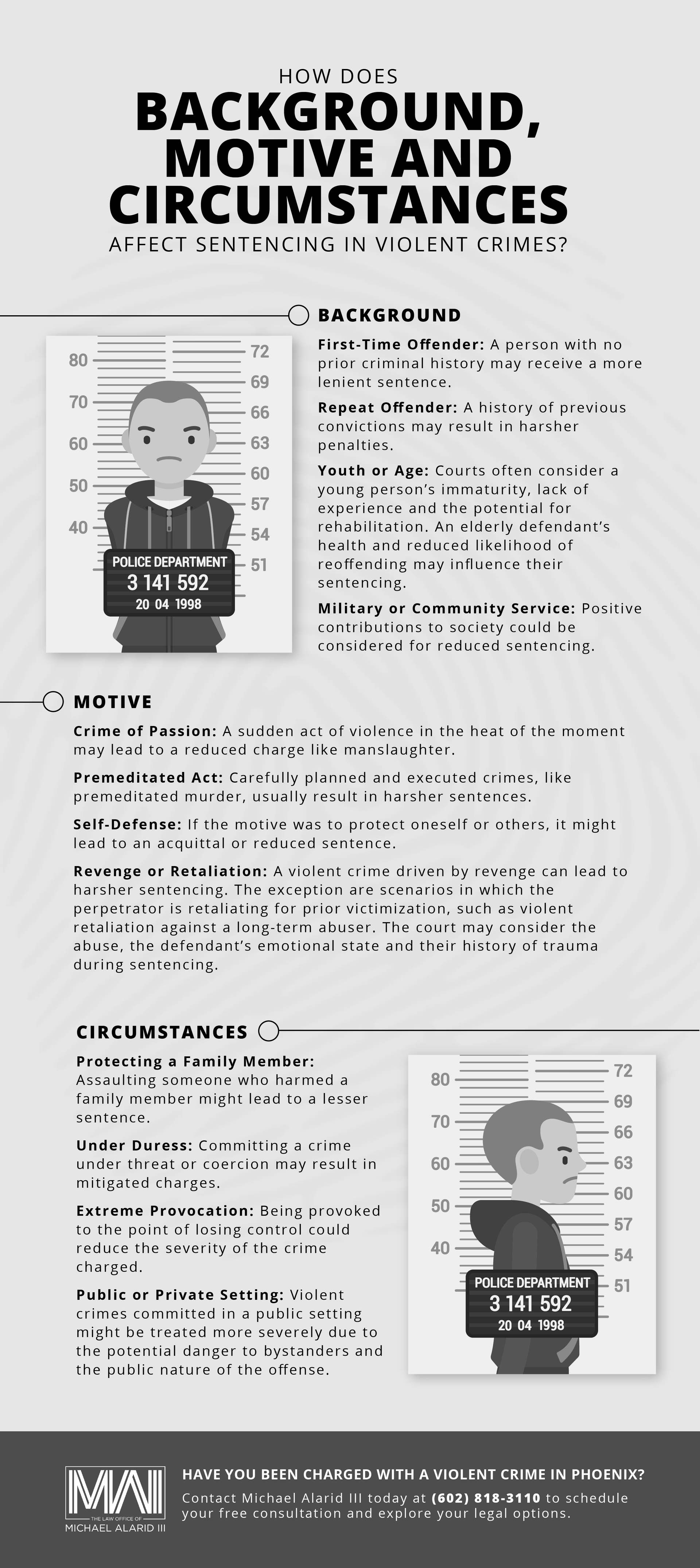How Arizona Courts Consider Background, Motive and Circumstances in Violent Crime Sentencing

When it comes to sentencing in violent crime cases, Arizona courts take into account more than just the crime itself. They consider background, motive and circumstances surrounding the offense.
These factors play a crucial role in determining the severity of the sentence. Two people convicted of the same offense can experience significantly different sentencing outcomes depending on these variables.
Crime of Passion vs. Premeditated Crimes
In Arizona, violent crimes are classified into different degrees based on the nature and circumstances of the offense. Two common categories are crimes of passion and premeditated crimes. The distinction between these two can have a profound impact on sentencing.
Crime of Passion
A crime of passion, also known as voluntary manslaughter, occurs when a person commits a violent act in the heat of the moment, often driven by strong emotions such as anger, jealousy or fear.
These crimes are typically spontaneous, with little or no time for the individual to reflect on their actions. Arizona courts recognize that while the consequences of a crime of passion can be severe for the victim, the underlying cause of the incident and the lack of premeditation may justify some leniency.
- Example: An individual who discovers their spouse in an act of infidelity and, in a sudden fit of rage, commits a violent act, may be charged with voluntary manslaughter rather than murder. The emotional turmoil experienced in such situations can lead to a reduced sentence compared to a premeditated crime.
Premeditated Crimes
Premeditated crimes, on the other hand, involve planning and intent before the act is carried out. In Arizona, first-degree murder is an example of a premeditated crime. It can be charged when the perpetrator intentionally and with forethought plans and executes a fatally violent act. The level of planning and intent behind the crime is viewed as an aggravating factor, leading to harsher penalties.
- Example: A drug dealer who meticulously plans the murder of a rival to eliminate competition would likely face first-degree murder charges. The deliberate nature of the crime often results in more severe sentencing, including the possibility of life imprisonment or the death penalty.
The Impact of Motive on Sentencing
Motive, or the reason behind committing a crime, is another critical factor that Arizona courts consider during sentencing. While the law does not necessarily excuse criminal behavior based on motive, certain motivations can influence the severity of the punishment.
Self-Defense or Defense of Others
When an individual commits a violent act in self-defense or in defense of another person, the court may view the motive as a mitigating factor. Arizona law allows for the use of proportional force, including deadly force, if a person reasonably believes that they or someone else is in imminent danger. If the court determines that the use of force meets the legal criteria defined in castle doctrine and stand-your-ground laws, the charges may be reduced, or the individual may be acquitted altogether.
- Example: If a person assaults an individual who was threatening their family member with a deadly weapon, the court may consider the act justified, leading to a reduced sentence or dismissal of charges.
Retaliation or Revenge
Acts of violence committed out of retaliation or revenge are generally viewed unfavorably by Arizona courts. While the emotional impetus behind such actions may be understandable, the law does not condone vigilantism. However, the circumstances leading to the retaliatory act may still influence the sentencing outcome.
- Example: If a person assaults someone who previously harmed a family member, the court may consider the emotional motivation behind the act. While this may not fully excuse the behavior, it could result in a lesser charge, such as aggravated assault instead of attempted murder, leading to a reduced sentence.
The Role of Criminal History in Sentencing
A defendant's criminal history is a major factor in Arizona's sentencing decisions. Courts generally impose harsher penalties on repeat offenders compared to those with a clean record, as a history of criminal behavior is often seen as an indication of a lack of rehabilitation or disregard for the law.
The sentencing guidelines for repeat offenders is outlined in Arizona’s habitual offender statute.
First-Time Offenders
Individuals with no prior criminal record are often treated more leniently by the court, particularly if the offense appears to be an isolated incident. Arizona law provides for the possibility of alternative sentencing options, such as probation, community service or rehabilitation programs, especially for non-violent offenses. However, in cases involving violent crimes, even first-time offenders may face incarceration, though the court may consider mitigating factors like remorse or the potential for rehabilitation when determining the sentence.
- Example: A first-time offender convicted of aggravated assault might receive a suspended sentence with conditions such as completing anger management courses and performing community service, rather than immediate incarceration, depending on the circumstances of the crime and the offender’s background.
Repeat Offenders
For individuals with a long history of criminal behavior, the court is more likely to impose severe penalties. Repeat offenders may be viewed as a threat to public safety, and as such, the sentencing guidelines often call for extended prison terms, especially for violent crimes.
- Example: A person with multiple prior convictions for assault may face a much longer prison sentence if convicted of another violent crime, as the court aims to protect the community from further harm.
Aggravating and Mitigating Factors in Sentencing
In addition to the above considerations, Arizona courts also weigh specific aggravating and mitigating factors during sentencing. Aggravating factors, such as the use of a weapon, infliction of severe injury or targeting vulnerable individuals, can lead to harsher penalties. Conversely, mitigating factors, such as the defendant's age, mental health or lack of prior criminal history, can result in reduced sentences.
Aggravating Factors
- Use of a Weapon: If a weapon was used during the commission of a violent crime, the court is likely to impose a more severe sentence.
- Severe Injury: Inflicting serious or life-threatening injuries on the victim can also lead to increased penalties.
- Targeting Vulnerable Individuals: Crimes committed against vulnerable individuals, such as children, the elderly or disabled persons, are often punished more harshly.
Mitigating Factors
- Youth or Advanced Age: Defendants who are very young or elderly may receive more lenient sentences due to their age.
- Mental Health Issues: If the defendant suffers from a mental illness that contributed to the crime, the court may consider this a mitigating factor.
- Lack of Criminal History: First-time offenders are often treated more leniently, as they may be more amenable to rehabilitation.
Are You Looking for a Phoenix Criminal Defense Attorney After Being Accused of a Violent Crime?
Michael Alarid III, an Arizona board-certified specialist in criminal defense, has the experience and expertise needed to navigate the complexities of violent crime cases. He will thoroughly examine every aspect of your situation and work tirelessly to protect your rights and freedom.
Contact Michael Alarid III today to schedule your free consultation or give us a call at (602) 818-3110 and take the first step toward securing your future.




